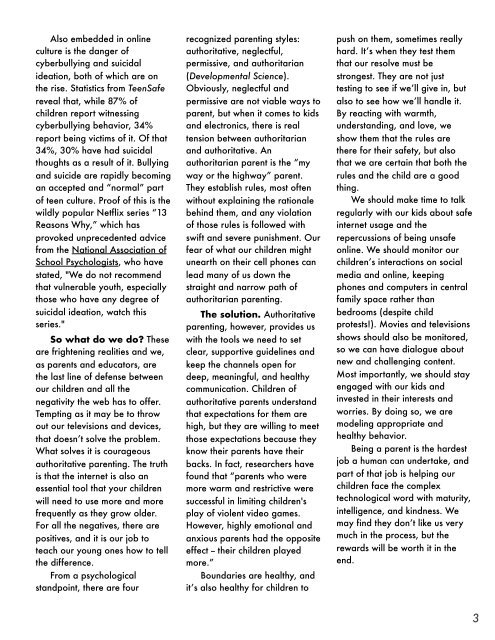Spring Connections 2017
You also want an ePaper? Increase the reach of your titles
YUMPU automatically turns print PDFs into web optimized ePapers that Google loves.
Also embedded in online<br />
culture is the danger of<br />
cyberbullying and suicidal<br />
ideation, both of which are on<br />
the rise. Statistics from TeenSafe<br />
reveal that, while 87% of<br />
children report witnessing<br />
cyberbullying behavior, 34%<br />
report being victims of it. Of that<br />
34%, 30% have had suicidal<br />
thoughts as a result of it. Bullying<br />
and suicide are rapidly becoming<br />
an accepted and “normal” part<br />
of teen culture. Proof of this is the<br />
wildly popular Netflix series “13<br />
Reasons Why,” which has<br />
provoked unprecedented advice<br />
from the National Association of<br />
School Psychologists, who have<br />
stated, "We do not recommend<br />
that vulnerable youth, especially<br />
those who have any degree of<br />
suicidal ideation, watch this<br />
series."<br />
So what do we do? These<br />
are frightening realities and we,<br />
as parents and educators, are<br />
the last line of defense between<br />
our children and all the<br />
negativity the web has to offer.<br />
Tempting as it may be to throw<br />
out our televisions and devices,<br />
that doesn’t solve the problem.<br />
What solves it is courageous<br />
authoritative parenting. The truth<br />
is that the internet is also an<br />
essential tool that your children<br />
will need to use more and more<br />
frequently as they grow older.<br />
For all the negatives, there are<br />
positives, and it is our job to<br />
teach our young ones how to tell<br />
the difference.<br />
From a psychological<br />
standpoint, there are four<br />
recognized parenting styles:<br />
authoritative, neglectful,<br />
permissive, and authoritarian<br />
(Developmental Science).<br />
Obviously, neglectful and<br />
permissive are not viable ways to<br />
parent, but when it comes to kids<br />
and electronics, there is real<br />
tension between authoritarian<br />
and authoritative. An<br />
authoritarian parent is the “my<br />
way or the highway” parent.<br />
They establish rules, most often<br />
without explaining the rationale<br />
behind them, and any violation<br />
of those rules is followed with<br />
swift and severe punishment. Our<br />
fear of what our children might<br />
unearth on their cell phones can<br />
lead many of us down the<br />
straight and narrow path of<br />
authoritarian parenting.<br />
The solution. Authoritative<br />
parenting, however, provides us<br />
with the tools we need to set<br />
clear, supportive guidelines and<br />
keep the channels open for<br />
deep, meaningful, and healthy<br />
communication. Children of<br />
authoritative parents understand<br />
that expectations for them are<br />
high, but they are willing to meet<br />
those expectations because they<br />
know their parents have their<br />
backs. In fact, researchers have<br />
found that “parents who were<br />
more warm and restrictive were<br />
successful in limiting children's<br />
play of violent video games.<br />
However, highly emotional and<br />
anxious parents had the opposite<br />
effect -- their children played<br />
more.”<br />
Boundaries are healthy, and<br />
it’s also healthy for children to<br />
push on them, sometimes really<br />
hard. It’s when they test them<br />
that our resolve must be<br />
strongest. They are not just<br />
testing to see if we’ll give in, but<br />
also to see how we’ll handle it.<br />
By reacting with warmth,<br />
understanding, and love, we<br />
show them that the rules are<br />
there for their safety, but also<br />
that we are certain that both the<br />
rules and the child are a good<br />
thing.<br />
We should make time to talk<br />
regularly with our kids about safe<br />
internet usage and the<br />
repercussions of being unsafe<br />
online. We should monitor our<br />
children’s interactions on social<br />
media and online, keeping<br />
phones and computers in central<br />
family space rather than<br />
bedrooms (despite child<br />
protests!). Movies and televisions<br />
shows should also be monitored,<br />
so we can have dialogue about<br />
new and challenging content.<br />
Most importantly, we should stay<br />
engaged with our kids and<br />
invested in their interests and<br />
worries. By doing so, we are<br />
modeling appropriate and<br />
healthy behavior.<br />
Being a parent is the hardest<br />
job a human can undertake, and<br />
part of that job is helping our<br />
children face the complex<br />
technological word with maturity,<br />
intelligence, and kindness. We<br />
may find they don’t like us very<br />
much in the process, but the<br />
rewards will be worth it in the<br />
end.<br />
3


